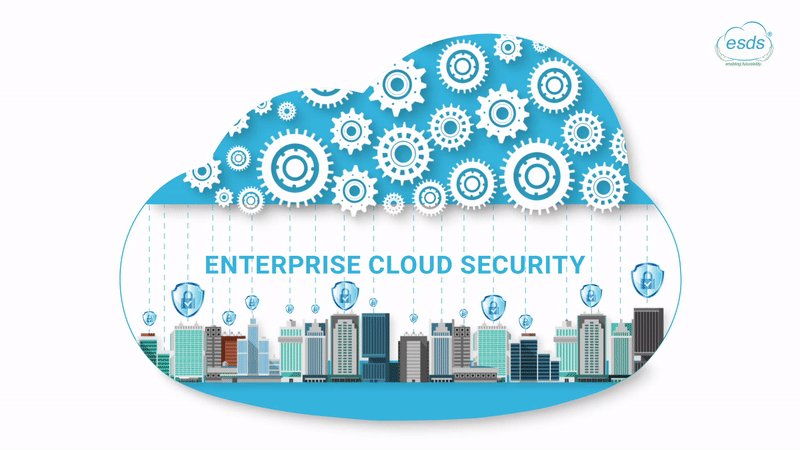Enterprise Cloud Security: Significance and Best Practices Explored

Today, many businesses place a high priority on cyber security. As more and more organizations move their operations to the cloud, they must ensure that their data and systems are protected from cyber risks. Let’s explore enterprise cloud security in this blog post, along with its importance and practical application for businesses.
What Exactly is Enterprise Cloud Security?
Enterprise cloud security refers to the collection of tools, guidelines, and procedures that a company employs to safeguard its data and online assets. It includes a range of security measures, including network security, vulnerability management, identity and access management, and encryption. The purpose of enterprise cloud security is to safeguard sensitive data from being stolen by hackers.
Cloud security can be categorized into three primary domains:
- Infrastructure Security: Entails securing the servers, storage, and networking components that make up the underlying cloud infrastructure. Network security, access control, encryption, and disaster recovery are all infrastructure security measures.
- Application Security: Protects the web applications, mobile applications, and APIs that are running on the cloud infrastructure. Secure coding procedures, vulnerability scanning, and authentication and authorization systems are all examples of application security measures.
- Data security: Pertains to the protection of data stored and processed in the cloud, encompassing sensitive customer information, financial data, and intellectual property. Data security measures encompass data encryption, access control, and data loss prevention.
What is the Significance of Enterprise Cloud Security?
It is crucial to make sure your cloud environment is secure as businesses move their operations to the cloud. Cloud environments are vulnerable to these threats as cyberattacks become more sophisticated. In fact, organisations now face new security risks brought on by the move to the cloud, including data loss as a result of improperly configured cloud resources and unauthorized access to sensitive information.

Enterprise cloud security holds significant importance for a variety of reasons:
Protecting sensitive data: Companies store a lot of private information about their clients, their finances, and their intellectual property in the cloud. Significant repercussions from a data breach can include monetary loss, harm to one’s reputation, and legal liability.
Requirements for compliance: Data security and privacy are subject to stringent regulatory compliance requirements in many industries. Heavy fines and legal repercussions may follow failure to comply with these rules.
Cyber threats: Malware, phishing scams, and ransomware are just a few examples of the cyberthreats that cloud infrastructure and data are vulnerable to. Enterprise data can be protected from these threats with the aid of a strong cloud security strategy.
Business continuity: Cloud downtime may have a significant negative impact on the company’s finances, output, and reputation. In the event of a cloud outage, business continuity can be ensured by a disaster recovery plan and backup procedures.
Putting Enterprise Cloud Security into Practice
A multi-layered strategy that takes into account various aspects of cloud security is necessary for implementing enterprise cloud security. The following are some best practices for setting up business cloud security:
Identity and Access Management: IAM is crucial for cloud security. It gives businesses the ability to limit who has access to and what they can do with their cloud resources. To ensure that only authorized personnel have access to sensitive data and systems, organisations should implement strong authentication mechanisms, such as multi-factor authentication, and regularly review access privileges.
Encryption: Data is encoded through the process of encryption to prevent unauthorized access. Data in transit and at rest should be protected by encryption for organisations. Additionally, they should ensure that encryption keys are securely stored and managed.
Network Security: Network security is essential for defending cloud environments against online dangers. To safeguard their networks, businesses should put in place firewalls, intrusion detection and prevention systems, and other security measures.
Vulnerability Management: Addressing vulnerabilities in cloud environments involves locating, ranking, and prioritizing vulnerabilities. Organizations should routinely check the resources in the cloud for vulnerabilities and apply patches and updates to fix them.
Security Monitoring: Security monitoring requires keeping an eye on cloud environments for questionable activity and quickly responding to security incidents. To identify and address security threats, organisations should implement security monitoring tools and procedures.
Cloud Security Solutions by ESDS

In conclusion, cloud security is a crucial component of defending an organization’s infrastructure, applications, and data against online threats. Organizations should adopt a multi-layered strategy for cloud security to accomplish this goal, one that addresses various facets of cloud security like identity and access management, encryption, and network security. Organizations can ensure that their cloud environments are secure and in compliance with industry and governmental regulations by putting these best practices into practice.
Cloud solutions offer the most effective means of safeguarding your data and digital assets. With a wide range of cloud providers available, selecting the right one can be challenging. To make the right choice, follow these steps: conduct due diligence, assess your organization’s needs, and select a provider that meets your requirements.
Using a cloud solution provides numerous benefits. Firstly, it ensures the security of your data. Secondly, it guarantees the availability and reliability of your systems, with ESDS offering a 99.995% Cloud infrastructure uptime guarantee. Thirdly, it offers scalability to accommodate your business growth. Fourthly, it provides convenience and accessibility, enabling data access from any device. Lastly, it allows organizations to focus on their core competency and enhance profitability.
Don’t wait until it’s too late. Strengthen your data center security today and stay ahead of the rapidly evolving world of data security.
- 6 Ways AI Reinvents the Security Landscape - January 9, 2024
- Top 6 Current Cybersecurity Trends For 2024 - January 9, 2024
- What Have We Learned from The Recent Cybersecurity Incidents? - January 3, 2024
